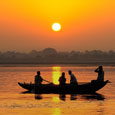|
The
Day of the Dead or El Dia de los Muertos is a popular tradition in Mexico and
other Latin countries since the pre-Columbian times.. It celebrates the reunion
of dead relatives with their families. It is believed that the spirit of the dead
visit their families on October 31 and leave on November 2. It is believed that
the spirit of the dead visit their families on October 31 and leave on November
2. This all stems from the ancient indigenous peoples of Mexico (Purepecha, Nahua,
Totonac and Otomí) who believed that the souls of the dead return each
year to visit with their living relatives - to eat, drink and be merry. Just like
they did when they were living. Mexicans welcome the dead by preparing special
foods in honor of those who have departed and placing them on altars along with
food such as pan de muertos baked usually in the shapes of skulls. On this day
the Mexican streets near the cemeteries spills over with festivities and decorations
of papel picado, candy calveras (skulls and skeletons) flowers and parades. It may sound weird but for the Mexicans "death" and "festivities" go hand in hand. For someone alien to the culture, it may be difficult to grasp the concept, but the fact is that the Mexicans react to death with mourning tinged with happiness and joy. They believe in the life - death - rebirth continuum and its quite natural for them. The difference in the way the Mexicans look at death owes to the fact that they have learnt to accept it as an inevitable and inescapable end top life. Therefore, instead of regarding death as a relentless force beyond human comprehension and living in constant fear of it, they take it in good humor. According to the current practice, the Mexicans remember the deceased children on All Saint's Day (November 1st). Their graves are adorned with toys and colorful balloons on this day. The next day, i.e the All Souls Day is the day to fondly remember the deceased adult members of the family. Their favorite food and drink, their personal belongings and an embellished altar build in their name are used to honor them. Candles are lit, the ancient incense copal is burned, prayers and chants for the dead are intoned and then food and drinks are consumed in a party or picnic-like atmosphere. At about sunset, the bells begin to ring summoning the dead. The bells are kept ringing throughout the night. At sunrise, the ringing stops and those relatives who have kept the night-long vigil, go home. There are various symbols associated with the celebration of Dia de los Muertos. They include the elaborately decorated pan de muerto, a rich coffee cake decorated with meringues to make it appear like bones, skull-shaped sweets and candies, papier maché skeletons and skulls and marizpan death figures. These macabre symbols and other similar items flood the shops by mid-October. There are folktales believed and told that say the dead spirits will get revenge on the living if they get poor treatment during these days each year. Leaving nothing (or inferior gifts) on the altar causes the spirits to be angry or sad. These superstitions inspire many people to participate in this holiday celebration for this very reason. Death is literally mocked at by the Mexicans. La calaca (the skeleton), la flaca ("skinny"), la pelona ("baldy") and la huesada ("bony") are some of the common derogatory adjectives they use for death. Their are also songs, poems and refrains associated with the Day of the Dead. Calaveras (skulls) are decorated with bright colors with the name of the departed inscribed on the head. Children carrying yellow marigolds enjoy the processions to the cemetery. The most spectacular celebrations of the Day of the Dead celebrations take place on the island of Janitzio in Lago de Pátzcuaro. Here, at the crack of dawn (on November 1st) the Purepechan Indians initiate the festivities with a ceremonial duck hunt. At midnight, the cooked duck and other edibles are brought to the cemetery in the flickering light of thousands of candles. The praying woman and the chanting men make a wonderful spectacle in the candle-lit chilly night. In the nearby towns of Tzintzuntzan (the ancient capital of the Purepechan people), Erongarícuaro and Jaráuaro, other ceremonies also take place. Oaxaca, Patzcuaro (Michaocan),Huejutla (State of Hidalgo), Chiapa de Corzo (Chiapas), Jesús María (Nayarit), Míxquic (Federal District) and even Tecate (Baja California) are some other Mexican cities that celebrate the day with great gusto. Death is part of life and is representative of the Mexican spirit and tradition which says: "Don't take anything lying down - even death!" |

Parents' Day
National Hot Dog Day
Father-in-Law Day
Christmas in July
Friendship Day
Christmas Around The World
Multifaceted Lifestyle Blog
How to have a Great Date
All about Gardening in Apartments
Personal finance and Financial Independence
Online IBAN bank Account
Personal Loans
|
 Friendship Day
Friendship Day Good Morning
Good Morning